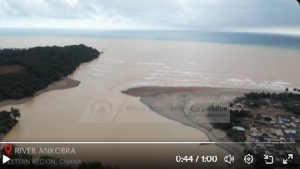The impact of the menace of illegal mining, popularly called galamsey, which has been destroying Ghana’s water bodies and forest reserves, is now reaching beyond the borders of the country.
The Atlantic Ocean is now being polluted as a result of galamsey activities.
Even though there are no records of galamsey activities taking place on the Atlantic Ocean, it is being polluted by the rivers in Ghana that flow into it at the Gulf of Guinea, the northeasternmost part of the tropical ocean.
This means that fish and other aquatic life in the ocean would be affected by chemicals used by illegal miners to process mineral ore.
A video shared by the state broadcaster, Ghana Broadcasting Corporation (GBC), shows the Gulf of Guinea heavily polluted.
The video showed the galamsey-polluted River Ankobra flowing into the ocean around Takoradi in the Western Region. Both the estuary (the converging point of the River Ankobra and the Atlantic Ocean) and part of the ocean looked deep brown, suggesting that it was full of mercury, arsenic, and lead used to process minerals, which are toxic to aquatic life and humans.
Residents of coastal communities in Cape Coast and the Western Region have been complaining about the drastic reduction in fish they get from the ocean due to the activities of galamsey.
Watch the video below:
This is where River Ankobra enters the sea.
— Kafui Dey (@KafuiDey) September 25, 2024
The fight continues.....#StopGalamsayNow pic.twitter.com/GeKlPjw4M0
BAI/ ADG
Watch the latest episode of Everyday People on GhanaWeb TV below:
Ghana’s leading digital news platform, GhanaWeb, in conjunction with the Korle-Bu Teaching Hospital, is embarking on an aggressive campaign which is geared towards ensuring that parliament passes comprehensive legislation to guide organ harvesting, organ donation, and organ transplantation in the country.













